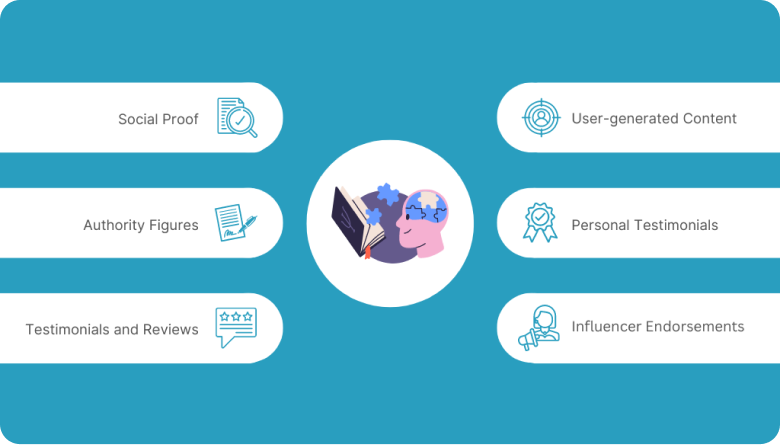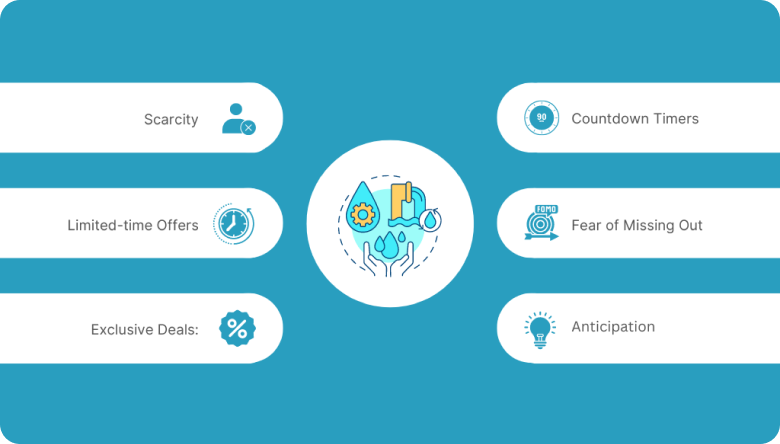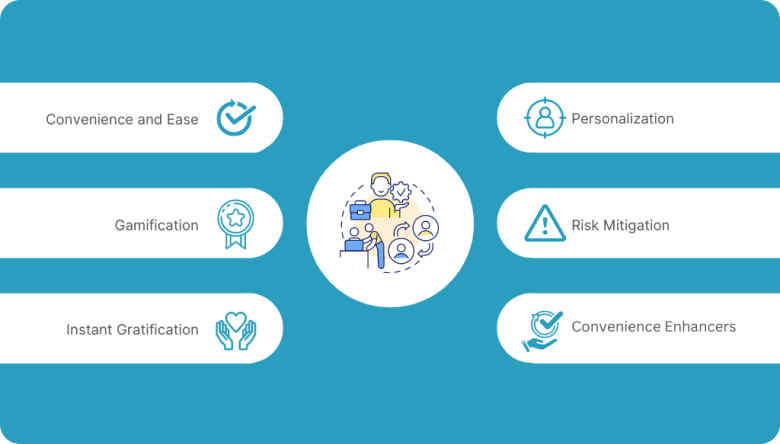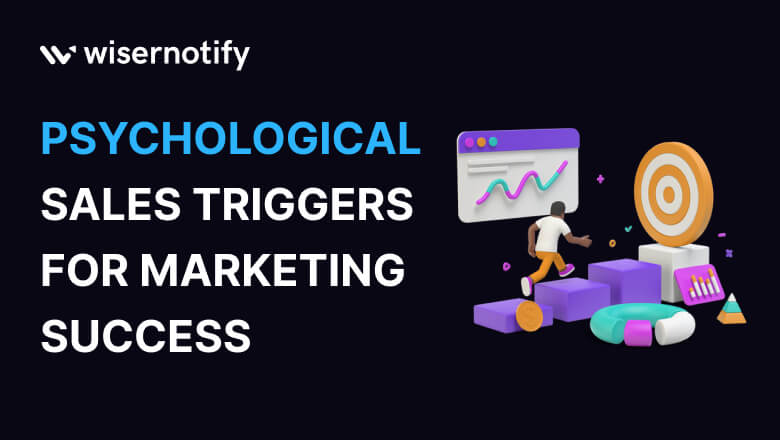Imagine walking through a little bookstore, the scent of old pages filling the air. As you see the shelves, your attention is suddenly captured by a book cover—a vibrant illustration with an intriguing title that seems to whisper, “Pick me up and read me.” Curiosity piqued, you can’t resist reaching for the book and soon find yourself immersed in a captivating story right from the first page.
Just like that book cover that grabbed your attention, there are psychological triggers that can captivate and drive your potential customers toward making a purchase. Welcome to our blog, where we unravel the secrets of leveraging psychological triggers in sales and marketing strategies.
Recall the most recent occasion when you were browsing through your social media feed. What made you pause and click on a specific ad or post? Maybe you stumbled upon a touching tale that pulled at your heart, triggering emotions you couldn’t resist. Emotions hold significant sway when it comes to making decisions, and we’ll delve into ways you can tap into them to establish profound and personal connections with your audience.
Now, let’s transport ourselves to a bustling farmers’ market. You stroll past stalls overflowing with fresh produce, but one, in particular, catches your eye. The vendor has set up a small tasting table, offering delectable bite-sized samples of their mouthwatering creations. The explosion of flavors that dance on your taste buds draws you in irresistibly. This showcases the impact of sensory triggers in engaging customers and leaving lasting impressions.
One more, Imagine stepping into a sleek, modern showroom. The air is charged with an aura of exclusivity and sophistication. The carefully curated displays and the attentive sales staff make you feel like a valued VIP. This is the power of triggering a sense of exclusivity and status, compelling customers to desire what you have to offer.
Throughout this blog, we’ll deep into these psychological triggers, providing practical insights and actionable strategies to maximize your sales and marketing success. Marketers can utilize 12 psychological sales triggers throughout the sales process, from creating awareness to closing the sale.
Here are psychological triggers commonly used in sales & marketing strategies:
1. Psychological Sales Triggers: Influencing Purchase Decisions
In the huge world of online shopping, persuading clients to pick your brand is critical. Understanding and using psychological sales triggers can be crucial in influencing purchase choices. These triggers strike at the heart of human behavior, eliciting emotions and influencing consumer choices. This article will discuss the significance of various psychological sales triggers and offer practical suggestions for implementing them into your online website or marketing initiatives.

- Social Proof: Humans seek validation from others, and social proof caters to that need. You can build trust and credibility by showcasing customer testimonials, reviews, and ratings. Take, for example, TripAdvisor, a travel website that prominently displays user reviews and ratings, helping potential travelers make informed decisions.
- Authority Figures: People tend to follow the guidance of authoritative figures. Incorporate industry experts, influencers, or well-known personalities who align with your brand values. An excellent example is Rolex, which associates its luxury timepieces with influential figures like athletes and actors, establishing its authority in the industry.
- Testimonials and Reviews: Personal success stories and good experiences from delighted consumers are appealing to future shoppers. Display powerful testimonials on your website or in marketing materials. Grammarly, an online writing assistant, for example, displays testimonials from customers who have achieved writing success using their product.
- User-generated Content: Encourage customers to create and share content related to your brand or products. User-generated content, such as customer photos, videos, or reviews, adds authenticity and builds a sense of community. GoPro effectively leverages user-generated content by featuring thrilling adventure footage captured by its customers.
- Influencer Endorsements: Partnering with influencers who align with your brand values can significantly impact purchase decisions. Collaborate with influencers to showcase your products or services to their engaged audience. Fashion retailer ASOS collaborates with fashion influencers to showcase their latest trends and inspire their target audience.
- Personal Testimonials: Dive deeper into individual stories and experiences to create a powerful connection. Share personal testimonials of customers who have overcome challenges or achieved remarkable results with your offerings. Brands like Weight Watchers feature personal stories of individuals who have successfully lost weight using their program.
Remember to write an engaging story for each trigger, using the power of social proof, authority figures, testimonials and reviews, user-generated content, celebrity references, and personal testimonials. You can create a genuine and powerful brand message that connects with your target audience by deliberately using these triggers, eventually boosting conversions and sales.
Related Post: Social Proof Psychology in Consumer Behavior
2. Creating Scarcity and Urgency: Boosting Sales with Limited-time Offers
Creating a sense of scarcity and urgency can be a strong sales approach. Businesses can tap into the fundamental human drive to grasp chances and avoid losing out by utilizing psychological triggers related to scarcity, time-limited offers, and exclusive bargains. We’ll explore how you can integrate these triggers into your marketing campaigns to boost conversions and foster consumer engagement.

- Scarcity: Scarcity is a psychological trigger that taps into people’s fear of missing out on something valuable. Highlight limited availability or stock levels to create a sense of urgency. Apple effectively uses scarcity by releasing limited edition products that generate tremendous buzz and anticipation among their customer base.
- Limited-time Offers: Setting specific timeframes for promotions and discounts can create a sense of urgency and encourage immediate action. For example, Amazon’s “Deal of the Day” offers limited-time discounts on various products, motivating customers to purchase before the offer expires.
- Exclusive Deals: Offering exclusive deals to a select group of customers creates a feeling of exclusivity and special treatment. VIP or loyalty programs that provide exclusive discounts or early access to new products can entice customers to engage and purchase. Sephora’s Beauty Insider program offers exclusive discounts and rewards to its loyal customers.
- Countdown Timers: Adding countdown timers to your website or email campaigns can create a sense of urgency and drive immediate action. Countdown timers visually represent time running out, motivating customers to take advantage of limited-time offers. Booking.com effectively uses countdown timers to show the remaining time to book a hotel room at a discounted rate.
- Fear of Missing Out (FOMO): The fear of missing out is a powerful psychological trigger that taps into people’s desire to be part of something exciting or exclusive. Highlight the benefits and unique aspects of your product or offer to evoke a sense of FOMO. Ticket-selling platforms like StubHub often use phrases like “limited tickets remaining” to create a sense of urgency and compel customers to purchase.
- Anticipation: Building anticipation around upcoming product launches or events can generate excitement and encourage early adoption. Teaser campaigns, sneak peeks, and pre-order opportunities can create a sense of urgency and anticipation among your target audience. Video game companies like Nintendo often release teaser trailers and limited-time pre-order options to build anticipation for their new game releases.
Adding these triggers related to scarcity and urgency to your sales and marketing strategies can help drive customer engagement, increase conversions, and boost sales.
3. Cognitive Triggers: Persuasion Techniques for Increased Conversions
Cognitive triggers tap into how our minds process information and make decisions, allowing businesses to influence purchasing choices effectively. Here you will learn the importance of cognitive triggers and get practical ideas on incorporating persuasion techniques into your marketing strategies to increase conversions and drive customer engagement.
- Anchoring and framing: Anchoring and framing are cognitive triggers that involve presenting information in a way that influences perception and decision-making. You can guide customers toward desired outcomes by setting an initial reference point (anchor) and presenting subsequent information in a favorable light (framing). Apple, for example, often introduces higher-priced versions of its products first, anchoring the customer’s perception of value before presenting lower-priced options.
- Loss Aversion: Loss aversion is a cognitive trigger based on the principle that people feel the pain of loss more intensely than the pleasure of gain. Positioning your product or offer as a way to avoid loss or mitigate risks can be persuasive. Insurance companies, such as Geico, emphasize the potential financial losses customers could face without insurance coverage, playing on the fear of loss to drive conversions.
- Risk Reversal: Reducing or eliminating perceived risks associated with a purchase can instill confidence and increase conversions. Offer guarantees, warranties, or trial periods to alleviate customer concerns. Online retailers like Zappos offer hassle-free return policies, reassuring customers that they can shop confidently.
- Preemptive Selling: Preemptive selling involves addressing potential objections or concerns before customers even raise them. You can build trust and credibility by proactively addressing common questions or hesitations. Apple’s website provides detailed product information, including FAQs and customer reviews, to preemptively address potential customer inquiries.
- Cognitive Dissonance: Cognitive dissonance occurs when individuals experience discomfort due to conflicting thoughts or beliefs. By creating a gap between customers’ current beliefs or behaviors and your product’s benefits, you can motivate them to take action to resolve the dissonance. Fitbit, for instance, highlights the discrepancy between customers’ health goals and their current activity levels, encouraging them to purchase fitness trackers to bridge the gap.
By understanding how the mind processes information and leveraging these cognitive triggers, you can create persuasive marketing campaigns that resonate with your target audience and drive desired actions.
4. Emotional and Identity Triggers: Connecting Emotionally with Customers
Building a strong emotional connection with customers is a powerful way to drive engagement and boost conversions. Businesses can tap into customers’ deep-rooted emotions, personal aspirations, and social identities by leveraging emotional and identity triggers. We will explore the importance of emotional and identity triggers and provide practical ideas on connecting with customers emotionally to increase conversions and foster long-term loyalty.
- Emotional Triggers: Emotions play a significant role in purchase decisions. You can create a strong emotional connection by understanding your target audience’s emotions and aligning your marketing messaging accordingly. For example, Nike’s “Just Do It” campaign appeals to customers’ motivation, determination, and desire for self-improvement, inspiring them to take action.
- Storytelling: Storytelling is a powerful tool that helps customers connect with your brand on a deeper level. By weaving narratives that resonate with their experiences, values, and aspirations, you can foster a sense of empathy and build trust. Through their “Belong Anywhere” campaign, Airbnb shares heartwarming stories of travelers immersing themselves in local communities, creating emotional connections with their audience.
- Likability and Personal Connection: People are likelier to engage with and buy from brands they like and feel a personal connection. Showcase your brand’s personality, values, and human side to foster likability and establish a genuine connection with customers. Ben & Jerry’s, known for their social and environmental activism, connects with customers who share their values, building a loyal customer base.
- Social Identity: People often align their purchases with their social identities and affiliations. Tap into customers’ desire for belonging and acceptance by emphasizing how your brand aligns with their social identity. Red Bull successfully connects with extreme sports enthusiasts, positioning their brand as the drink of choice for adrenaline junkies.
- Personal Goals and Aspirations: Understanding your customers’ goals and aspirations allows you to tailor your messaging to resonate with their desires. Show how your product or service can help them achieve their goals and fulfill their aspirations. Peloton, a fitness equipment company, appeals to customers’ desire for convenience and fitness by offering live and on-demand workouts that can be done from home.
- Visualization: Help customers envision the positive outcomes and benefits they can experience using your product or service. Use compelling visuals and descriptions to create a vivid picture of the transformation or improvement they can achieve. Weight loss programs like WW (formerly Weight Watchers) showcase before-and-after photos, enabling customers to visualize their potential success.
- Nostalgia: Tapping into nostalgia can create a powerful emotional connection. Invoke positive memories and emotions associated with the past to resonate with your target audience. Coca-Cola’s holiday advertisements often evoke nostalgia by featuring heartwarming scenes and iconic holiday imagery.
5. Persuasion and Influence Strategies: Convincing Customers to Buy
Mastering persuasion and influence strategies are crucial for businesses aiming to convince customers to purchase. By understanding and employing various psychological triggers, brands can effectively sway consumer behavior and drive sales. We will explore three powerful persuasion and influence strategies: reciprocity, consistency, commitment, novelty, and innovation.
- Reciprocity: Reciprocity is a persuasion strategy based on the principle of giving and receiving. By offering something of value upfront, you can create a sense of obligation in customers to reciprocate the favor. You can provide free samples, exclusive discounts, or valuable content. For example, Sephora offers free beauty samples to customers, triggering a sense of reciprocity and increasing the likelihood of future purchases.
- Consistency and Commitment: Consistency and commitment are persuasive techniques that capitalize on people’s desire to align their behaviors with self-perception. E
ncourage customers to make small commitments or take initial steps towards a purchase, leading to the more outstanding commitment and a higher chance of conversion. Fitness apps like MyFitnessPal prompt users to set personal goals, fostering a sense of commitment that drives continued engagement and potential subscription upgrades. - Novelty and Innovation: The human brain is wired to seek novelty and respond to innovative offerings. Incorporating novelty and innovation into your products, services, or marketing campaigns can capture customers’ attention and spark curiosity. Innovative elements can differentiate your brand, introducing a unique feature, a limited-edition collection, or a new and exciting user experience. Apple consistently introduces innovative features in their iPhone launches, creating buzz and anticipation among their customer base.
Also See: Role of Social Influence on Consumer Trust Decisions
6. Enhancing Customer Experience: Driving Sales through Personalization
A personalized customer experience is essential for driving sales and fostering customer loyalty. By tailoring your offerings to individual preferences and needs, you can create a deeper connection with customers and enhance their overall experience. We will explore critical triggers for enhancing customer experience and driving sales through personalization.

- Convenience and Ease: Customers value convenience and ease in their shopping experience. Streamline the purchasing process by offering user-friendly interfaces, easy navigation, and fast checkout options. Amazon’s one-click ordering system exemplifies convenience and ease, allowing customers to purchase with a single click.
- Gamification: Engaging customers through gamification techniques can boost their interaction and motivate them to purchase. Incorporate elements of competition, rewards, and challenges into your marketing strategies. Nike’s NikeFuel system encourages customers to track their activity levels and earn rewards, transforming exercise into a gamified experience.
- Instant Gratification: Customers seek immediate satisfaction and gratification. Offer expedited shipping options, instant downloads, or instant access to services to meet their desire for instant results. Netflix, for example, provides instant streaming of movies and TV shows, allowing customers to enjoy their favorite content without delay.
- Personalization: Personalization is a powerful trigger for enhancing the customer experience. Tailor product recommendations, content, and offers based on individual preferences, browsing history, and purchase behavior. Spotify utilizes personalization by curating customized playlists for each user based on their music preferences and listening habits.
- Risk Mitigation: Addressing customer concerns and mitigating perceived risks can instill confidence and drive sales. Provide clear return policies, money-back guarantees, or free trials to reduce perceived purchase risks. Shopify, a leading e-commerce platform, offers a 14-day free trial, allowing potential customers to test their platform risk-free.
- Convenience Enhancers: Go the extra mile to enhance convenience for your customers. Offer features like saved payment information, personalized account dashboards, or order tracking to streamline their experience. Uber incorporates convenience enhancers by allowing customers to store their payment details and quickly request rides with a few taps on their mobile devices.
Focus on providing convenience and ease, leveraging gamification techniques, offering instant gratification, implementing personalization strategies, mitigating risks, and enhancing convenience throughout the customer journey.
7. Exclusivity and Status Triggers: Using Social Validation to Drive Sales
Exclusivity triggers tap into people’s desire for unique experiences and products, while social validation triggers capitalize on the power of social proof and influence. We will explore the importance of exclusivity and status triggers and provide practical ideas on incorporating them into your marketing strategies to increase sales and drive customer engagement.
- Exclusivity: Exclusivity triggers revolve around offering limited access or unique experiences to a select group of customers. By positioning your product or service as exclusive, you can generate a sense of desirability and make customers feel privileged. Luxury brands like Louis Vuitton thrive on exclusivity, creating limited edition collections available only to a select few.
- Social Validation: Social validation triggers leverage the power of social proof to influence purchasing decisions. Showcase positive reviews, testimonials, and user-generated content to demonstrate that others have already chosen and benefited from your offerings. TripAdvisor utilizes social validation by displaying user-generated reviews and ratings to help travelers make informed choices about accommodations, restaurants, and attractions.
- Price Anchoring: Price anchoring triggers involve presenting different pricing options to influence customers’ perception of value. By strategically positioning higher-priced options alongside lower-priced options, you can anchor customers’ expectations and make the lower-priced option appear more affordable. Software companies like Adobe offer different pricing tiers, with the highest tier as an anchor to make the lower-priced tiers seem more reasonable.
- VIP Access: Offering VIP access or special privileges to loyal customers can create a sense of exclusivity and elevate their status. Provide exclusive discounts, early access to new products or services, or personalized customer support to reward and retain your most valuable customers. Amazon Prime exemplifies VIP access with benefits such as free two-day shipping, exclusive deals, and access to streaming services.
- Social Comparison: Social comparison triggers play on the natural human tendency to compare ourselves to others. Highlight how your product or service can enhance customers’ status or social standing. Brands like Rolex emphasize the prestige and status associated with owning their timepieces, appealing to individuals who seek recognition and admiration from their peers.
By tapping into these triggers, you can create a sense of exclusivity, elevate your brand’s status, and drive sales by appealing to customers’ desires for unique experiences and social validation.
8. Ethical and Social Responsibility: Aligning Sales with Social Impact
Embracing ethical and socially responsible strategies enhances brand reputation and establishes a genuine connection with customers who prioritize sustainability and social issues. In this article, we will explore the importance of ethical and social responsibility in sales and provide practical ideas on how to incorporate these values into your marketing strategies to make a positive difference in the world.
- Social Responsibility: Social responsibility involves actively considering the impact of business operations on society. It encompasses actions such as fair treatment of employees, responsible sourcing, and minimizing environmental impact. Patagonia, an outdoor clothing company, is known for its commitment to social responsibility through initiatives like using recycled materials and advocating for environmental causes.
- Sustainability and Ethics: Emphasizing sustainability and ethical practices can resonate with environmentally conscious consumers. Highlight eco-friendly production methods, renewable materials, or fair trade partne
rships. The Body Shop, a beauty brand, is recognized for its ethical stance against animal testing and its sustainable use of natural ingredients. - Cause-related Marketing: Cause-related marketing involves partnering with nonprofit organizations to support a specific cause. You can positively impact and enhance brand perception by aligning your brand with a cause that resonates with your target audience. TOMS, a shoe company, donates a pair of shoes to a child in need for every pair of shoes purchased, fostering a sense of purpose and social impact.
- Philanthropy: Philanthropy involves actively giving back to the community through charitable donations or initiatives. Consider supporting local charities, educational programs, or social initiatives that align with your brand values. For example, Starbucks has a foundation supporting education and community development programs.
- Community Engagement: Engaging with the local community fosters goodwill and strengthens customer relationships. Participate in community events, sponsor local sports teams, or collaborate with community organizations. Google’s Community Grants program provides funding and resources to nonprofit organizations in their local communities.
By integrating ethical and social responsibility into your sales and marketing strategies, you can demonstrate your commitment to making a positive impact while building customer trust and loyalty.
9. Curiosity and Intrigue: Captivating Customers through Mystery Offers
By utilizing psychological triggers related to curiosity and intrigue, businesses can create compelling marketing campaigns that pique the interest of their target audience. We will explore the importance of curiosity and intrigue in captivating customers. We will also provide practical ideas on how to incorporate these triggers into your marketing strategies to drive engagement and increase conversions.
- Curiosity: Curiosity is a powerful motivator that drives people to seek answers and explore the unknown. Tap into this innately human quality by creating curiosity-inducing marketing campaigns that leave customers eager to know more. Apple’s mysterious product announcements, shrouded in secrecy and anticipation, create a sense of curiosity among their loyal customer base.
- Teasers and Mystery Offers: Teasers and mystery offer effectively create anticipation and engage customers. Provide intriguing glimpses or hints about upcoming products, promotions, or exclusive offers. Cryptic messages or partial reveals can spark curiosity and leave customers wanting more. For example, video game companies often release teaser trailers that showcase snippets of gameplay and storylines, building anticipation among gamers.
- Exclusive Information: Offering complete information or insights to customers can pique their curiosity and make them feel like insiders. Provide behind-the-scenes access, sneak peeks, or insider tips related to your products or industry. Tesla, for instance, often shares exclusive information about their upcoming electric vehicle models, creating curiosity and excitement among their fan base.
- Hidden Benefits: Reveal hidden benefits or features of your products or services gradually to create intrigue. Highlight unique functionalities or hidden surprises that customers can discover. Google’s search engine frequently incorporates hidden Easter eggs or interactive features, enticing users to explore and discover them.
- Unconventional Approaches: Break away from traditional marketing approaches and employ unconventional tactics that grab attention and ignite curiosity. Use unconventional storytelling, unexpected visuals, or interactive experiences to engage customers. The Dollar Shave Club’s viral marketing campaign, featuring a humorous and unconventional video, captured the viewers’ curiosity and significantly increased brand awareness.
Incorporating these triggers of curiosity and intrigue into your marketing strategies can help captivate customers and drive engagement.
10. Authority and Expertise: Building Trust and Influence in Sales
Building trust and influence is crucial in the world of sales. Establishing yourself or your brand as an authority in your industry can significantly impact customer perceptions and drive sales. By leveraging psychological triggers related to authority and expertise, businesses can instill confidence in their target audience, build credibility, and influence purchase decisions. In this article, we will explore the importance of authority and expertise in sales and provide practical ideas on how to incorporate these triggers into your sales strategies to build trust and influence.
- Authority Bias: Authority bias is a psychological phenomenon where individuals are more likely to trust and follow the opinions or recommendations of authoritative figures. To leverage authority bias, showcase endorsements or partnerships with industry experts or influencers. For example, when a renowned chef endorses a kitchen appliance brand, it enhances its authority in the culinary world.
- Industry Expertise: Demonstrating deep knowledge and expertise in your industry positions you as a trusted source of information. Share valuable insights, tips, and educational content through blog posts, videos, or webinars. By becoming a go-to resource, you establish authority and attract customers who seek expert guidance. HubSpot, a leading inbound marketing platform, offers comprehensive educational content on its blog, establishing itself as an industry expert.
- Thought Leadership: Positioning yourself or your brand as a thought leader involves actively contributing to industry conversations, sharing original insights, and offering innovative perspectives. Publish articles, speak at industry conferences, or engage in panel discussions to showcase your thought leadership. Neil Patel, a renowned digital marketer, consistently shares in-depth marketing insights through his blog, establishing himself as a thought leader in the industry.
- Certifications and Accreditations: Highlighting relevant certifications and accreditations proves your expertise and commitment to excellence. Display these credentials on your website or marketing materials to build trust and credibility. For example, a financial advisor displaying certifications such as CFP (Certified Financial Planner) or CFA (Chartered Financial Analyst) reinforces their expertise in the field.
- Research and Data-driven Insights: Back your claims and recommendations with solid research and data-driven insights. Conduct studies and surveys or gather relevant industry data to support your messaging. Sharing compelling statistics and research findings helps build trust and positions you as a reliable source of information. Statista, a leading market, and consumer data provider, offers comprehensive research reports, enhancing its authority in data analysis.
Using these triggers related to authority and expertise in your sales strategies can significantly enhance your influence and build trust with your target audience. Remember to leverage authority bias, demonstrate industry expertise, establish thought leadership, highlight certifications and accreditations, and back your claims with research and data-driven insights.
11. Self-Expression Triggers: Tapping into Customers’ Identity for Sales
Understanding and tapping into customers’ identities is a powerful way to drive sales. By leveraging psychological triggers related to self-expression, social belongi
ng, and problem-solution alignment, businesses can connect with their target audience on a deeper level. In this article, we will explore the importance of self-expression triggers in sales and provide practical ideas on how to incorporate them into your marketing strategies to boost customer engagement and drive conversions.
- Social Belonging: Humans have an inherent need for social connection and belonging. You can tap into this psychological trigger by positioning your product or brand as a way to be part of a community or group. For example, Harley-Davidson motorcycles have successfully tapped into the social belonging trigger by creating a sense of camaraderie and identity among their passionate riders.
- Problem-Solution Alignment: Customers are drawn to products that align with their values, beliefs, and aspirations. You can tap into their sense of identity and purpose by highlighting how your product or service solves a problem or fulfills a specific critical need of your target audience. Patagonia, an outdoor clothing brand, appeals to customers who value sustainability and environmental responsibility, aligning their products with their customers’ identity.
- Self-Expression: Customers often seek products or experiences that allow them to express their individuality and showcase their unique personalities. By offering customizable options, personalization features, or products that reflect a specific lifestyle or aesthetic, you can tap into customers’ desire for self-expression. Nike’s “Nike By You” program allows customers to design and personalize their sneakers, allowing them to express their styles.
These self-expression triggers in your sales and marketing strategies can help create a solid emotional connection with your target audience.
12. Surprise and Delight: Creating Memorable Sales Experiences
Creating memorable customer experiences can be the key to building long-lasting relationships and driving repeat business. By incorporating the psychological triggers of surprise and delight, businesses can exceed customer expectations, foster loyalty, and generate positive word-of-mouth. We will explore the importance of surprise and delight in sales and provide practical ideas for creating memorable customer experiences.
- Story of Transformation: Telling a compelling story of transformation can captivate customers and create a lasting impression. Highlight how your product or service has positively impacted the lives of previous customers. For example, fitness apparel brand Lululemon often shares inspiring stories of individuals who have experienced significant physical and mental transformations through their products, leaving a lasting impression on their audience.
- Surprise and Delight: Surprising and delighting customers with unexpected gestures or personalized experiences can leave a lasting impression and foster positive emotions. Consider sending personalized thank-you notes, unexpected gifts, or providing exclusive upgrades or bonuses. Online retailer Zappos is known for its surprise and delight approach, occasionally upgrading customers to expedited shipping or sending unexpected gifts with their orders.
Sharing compelling stories of transformation and surprising customers with unexpected gestures can leave a lasting impression, fostering loyalty and positive brand associations.
Conclusion
In conclusion, incorporating psychological sales triggers into your marketing strategies can revolutionize your business. By harnessing the power of social proof, scarcity, cognitive triggers, emotional and identity triggers, persuasion and influence strategies, enhancing customer experience, exclusivity and status triggers, ethical and social responsibility, curiosity and intrigue, authority and expertise, self-expression triggers, and surprise and delight, you can effectively influence purchase decisions, boost conversions, and create memorable experiences.
To unlock the full potential of social proof and FOMO, our innovative marketing app is your ultimate solution. With the ability to leverage testimonials, reviews, and user-generated content to build trust, create a sense of urgency through countdown timers and limited-time offers, and optimize your marketing campaigns, our user-friendly platform empowers you to drive conversions and achieve remarkable results.
Don’t miss out on the opportunity to harness the power of social proof and FOMO. Join our community of successful businesses today by visiting our website. Elevate your sales and marketing efforts with the WiserNotify app, and unlock new levels of success for your business.
Remember, each psychological sales trigger uniquely connects with your target audience and influences their purchasing decisions. Embrace these triggers, leverage our social proof and FOMO app, and embark on a journey to transform your business’s success. Visit our website now and start experiencing exceptional sales and marketing outcomes.

